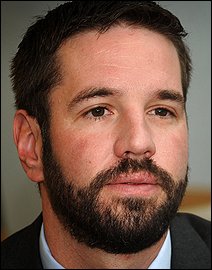
Matthew Hoh was asked to stay in the job. (The Washington Post)
When Matthew Hoh joined the Foreign Service early this year, he was exactly the kind of smart civil-military hybrid the administration was looking for to help expand its development efforts in Afghanistan.
A former Marine Corps captain with combat experience in Iraq, Hoh had also served in uniform at the Pentagon, and as a civilian in Iraq and at the State Department. By July, he was the senior U.S. civilian in Zabul province, a Taliban hotbed.
But last month, in a move that has sent ripples all the way to the White House, Hoh, 36, became the first U.S. official known to resign in protest over the Afghan war, which he had come to believe simply fueled the insurgency.
“I have lost understanding of and confidence in the strategic purposes of the United States’ presence in Afghanistan,” he wrote Sept. 10 in a four-page letter to the department’s head of personnel. “I have doubts and reservations about our current strategy and planned future strategy, but my resignation is based not upon how we are pursuing this war, but why and to what end.”
The reaction to Hoh’s letter was immediate. Senior U.S. officials, concerned that they would lose an outstanding officer and perhaps gain a prominent critic, appealed to him to stay.
U.S. Ambassador Karl W. Eikenberry brought him to Kabul and offered him a job on his senior embassy staff. Hoh declined. From there, he was flown home for a face-to-face meeting with Richard C. Holbrooke, the administration’s special representative for Afghanistan and Pakistan.
“We took his letter very seriously, because he was a good officer,” Holbrooke said in an interview. “We all thought that given how serious his letter was, how much commitment there was, and his prior track record, we should pay close attention to him.”
While he did not share Hoh’s view that the war “wasn’t worth the fight,” Holbrooke said, “I agreed with much of his analysis.” He asked Hoh to join his team in Washington, saying that “if he really wanted to affect policy and help reduce the cost of the war on lives and treasure,” why not be “inside the building, rather than outside, where you can get a lot of attention but you won’t have the same political impact?”
Hoh accepted the argument and the job, but changed his mind a week later. “I recognize the career implications, but it wasn’t the right thing to do,” he said in an interview Friday, two days after his resignation became final.
“I’m not some peacenik, pot-smoking hippie who wants everyone to be in love,” Hoh said. Although he said his time in Zabul was the “second-best job I’ve ever had,” his dominant experience is from the Marines, where many of his closest friends still serve.
“There are plenty of dudes who need to be killed,” he said of al-Qaeda and the Taliban. “I was never more happy than when our Iraq team whacked a bunch of guys.”
But many Afghans, he wrote in his resignation letter, are fighting the United States largely because its troops are there — a growing military presence in villages and valleys where outsiders, including other Afghans, are not welcome and where the corrupt, U.S.-backed national government is rejected. While the Taliban is a malign presence, and Pakistan-based al-Qaeda needs to be confronted, he said, the United States is asking its troops to die in Afghanistan for what is essentially a far-off civil war.
By Karen DeYoung
Tuesday, October 27, 2009
Source: The Washington Post
Related information:
– Morale dips for American marines in Afghanistan (Times):
“I’m not much for this war. I’m not sure it’s worth all those lives lost,” said Sergeant Christian Richardson as we walked across corn fields that will soon be ploughed up to plant a spring crop of opium poppy.
– Afghanistan opium production reaches 6,900 tons (PressTV)
Opium production rate has soared to 6,900 tons in Afghanistan in the past 10 years ‘despite‘ the presence of 100,000 foreign troops in the country for nearly eight years.
A report by the UN Office on Drugs and Crime said on Wednesday that Afghanistan produces 92 percent of the world’s opium that has devastating global consequences.
The UN report also noted that Afghanistan’s illegal opium production is worth 65 billion dollars.
The heroin and opium market feeds 15 million addicts, with Europe, Russia and Iran consuming half the supply, UNODC reported.
– Ron Paul: ‘The more troops we send the worse things get!’
– Ron Paul On The US Afghanistan War Policy
– Italians bribed the Taleban all over Afghanistan, say two senior Afghan officials
– Pentagon spends $400 per gallon of gas in Afghanistan
– President Obama quietly deploying 13,000 more US troops to Afghanistan
– Congressman Alan Grayson on Afghanistan
– Ten more US soldiers killed in Afghanistan
– ‘We’re pinned down:’ 4 US Marines die in Afghan ambush
– Top US commander in Afghanistan: The Taliban have gained the upper hand:
The Taliban have gained the upper hand in Afghanistan, the top American commander there said, forcing the U.S. to change its strategy in the eight-year-old conflict by increasing the number of troops in heavily populated areas like the volatile southern city of Kandahar, the insurgency’s spiritual home. Gen. Stanley McChrystal warned that means U.S. casualties, already running at record levels, will remain high for months to come.
(Source: The Wall Street Journal)
– General Sir David Richards: Afghanistan will take 30 to 40 years
– Former SAS Comander: Afghan operation is ‘worthless’



